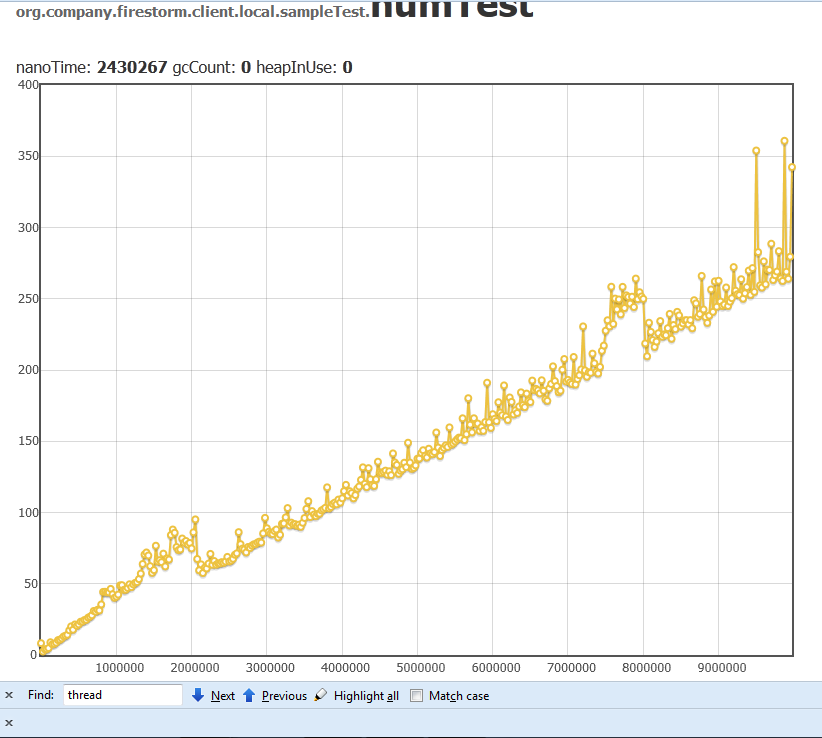It turns out there wasn't really a threshold where suddenly the signal broke out above the noise. My first test was fine grain low numbers. When I used 1 MB, 10 MB, 100 MB, and 1000 MB the results with a little noise were more or less linear.
My next task is to make a second test method and try writing a fixed amount of data (say, 10MB) with a varying number of concurrent threads. In the first trial, 1 thread writes 10MB; second trial, 2 threads write 5MB each, … 10 threads write 1MB (to separate files). My second method can call the first one so there is no need to duplicate that logic! I will need to come up with a strategy for giving the file a unique name each time I call the method.. see File.createTempFile() http://www.java-examples.com/create-temporary-file. Last summer in my embedded systems research class I had been introduced to multithreading programming but it was in C++ and C#.
Jonathan recommended The Java Tutorial http://docs.oracle.com/javase/tutorial/essential/concurrency/index.html. Since I had the C++ and C# multithreading background Jonathan thought I could skip to the "immutable objects" section and recommended I read that part and the following (High Level Concurrency) carefully. He thinks I will probably want to choose ExecutorService for my test. but to take the time to work through the whole guide. I found it to be more complicated than Win32 and OpenMP used in C++ and C#. Jonathan recommended not to dwell too much on synchronized, Thread.*, or Object.wait()/Object.notify(). He claimed the newer APIs (ExecutorService, Callable<T>, etc.) are more straightforward.
I read the link on File.createTempFile() and it seems to be understandable. It was the concurrency tutorial I had more trouble with. Oracle tutorials can be hard to follow because they assume too much and you have to jump around links to understand the material. Besides that multithreading programming is considered one of the more difficult things to do in computer science. I haven't used multithreading in over a half of year so I need a refresher course. I remember the basic concepts it's just the details I don't remember.Since I was having trouble I started reading other people's tutorials and blogs on multithreading and ExecutorService. Some of it is beginning to make sense but I haven't been unconfused enough to ask Jonathan intelligent questions. I have to wait until the fog in my head while reading clears before I can ask questions. That sometimes takes some time but I do get there. At 3 PM I was having a bad case of the Imposter Syndrome. I called my mother, the retired university professor, to talk about it. She can relate to it but says she was too stubborn to give up. Back in the 50s and 60s my mom was the only woman in her Russian and German classes especially in graduate school. I have lost a lot of confidence since having a PhD adviser calling me stupid. It hurt my test taking and studying long after I left his lab. I have a friend, Dr. John Reed, who is a retired UTA councilor and has been trying to help me with study techniques. He recommends study 50 minutes and then take a 10 minute break. Do that 3 times and then go off somewhere for two hours doing something else. Then come back and do the 50 minutes/10 minutes thing again. He told me not to study more than 8 hours a day. He claims the brain needs time to process the information. He knows I stare at the book and computer screen too long in desperation and gives me hell about it. I told him I feel guilty if I am not studying. John's methods don't jive too well with most employers who expect people to work a straight 8 hour day or more.. Jonathan hasn't complained to me and has been very supportive.
When I figure this all out I will be sure to post it so I can educate other poor souls.

No comments:
Post a Comment